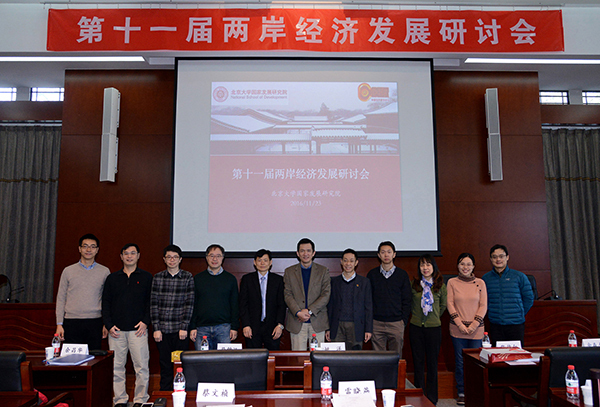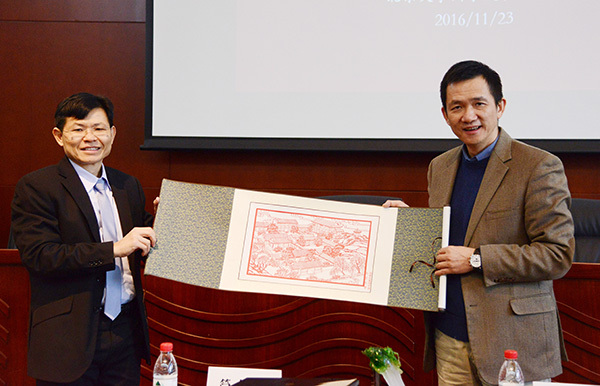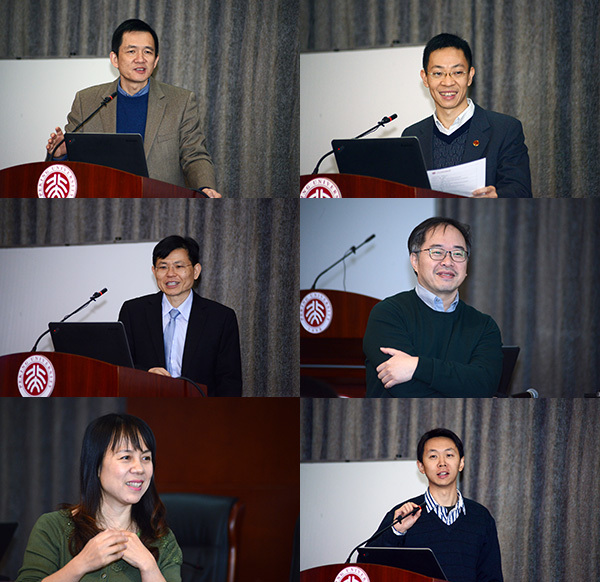

Group Photo with Seminar Representatives
From 21 – 25 November, Kamhon Kan, Director of Taiwan’s Institute of Economics, Academia Sinica (“IEAS”), led a group to visit Peking University’s National School of Development (“NSD”). Together, they held the “11th Cross Strait Economic Development Seminar”.

NSD Dean Yao Yang and IEAS Director Kamhon Kan Exchanging Gifts on Behalf of their Respective Organizations
NSD Dean Yao Yang, Vice Dean Yu Mao Jie, Prof. Lei Xiaoyan, Prof. Li Lixing, Prof. Wang Min, Prof. Yu Changhua and NSD PhD candidate You Wuyue attended the seminar. NSD Dean Yao Yand and IEAS Director Kamhon Kan exchanged gifts on behalf of their respective organizations.
The seminar’s topics included International Economics, Health Economics, Labor Economics, Political Economics and Macroeconomics. Using Taiwanese data to study intergenerational transmission of values and preferences, Professor Kamhon Kan found that the intergenerational transmission was very strong – indeed, attitudes of parents influence the life satisfaction of their children. Prof. Lei Xiaoyan used data from the China Health and Retirement Longitudanal Study (CHALRS) to research parents’ investment and transfer payments to their children and found that in rural areas, boys were favored over girls. Using Taiwanese data to study effects of transport costs on voting, Professor Cai Wenzhen found that if transport costs are lowered by 50%, voter turnout will rise by 7.04%. PhD candidate You Wuyue used Chinese county-level data and found that increasing female political participation can alleviate gender imbalance. Using company registration data, Prof. Li Lixing found that falling coal prices can alleviate ‘Dutch Syndrome’ – leading to more new company registration. Professor Zhang Junren reported on his article on the effect of expansionary monetary policy on capital allocation and inequality. Using a political economy framework, Prof. Wang Min discussed the effect of pension insurance on welfare. Professor Yu Changhua constructed a DSGE model and found that floating exchange rates require substantial capital flow subsidies. Professor Yang Ziting researched the effect of academic textbook reform on student identity. Professor Yu Miaojie used Chinese Company Micro-data and found that companies with higher degrees of input element distortions were more inclined to invest overseas.

The ‘Cross-strait Economic Development Seminar’ was established in 1996 by CCER founder Prof. Justin Lin and the former IEAS Director Xu Jiadong. The seminar is held on a biannual basis and has taken place eleven times. Its aim is to facilitate cross strait communication and mutual understanding in the academic economics sphere. The ‘12th Cross Strait Economic Development Seminar’ will be held in Taiwan in 2018.